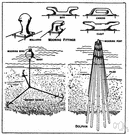

However, wharfage is solely the tax levied on the shipped goods and is mainly related to the loading and unloading of the cargo. Port charges include anchoring and sanitation facilities, anchorage and river dues, dock fees, customs duties etc. What is the difference between Wharfage and Port charges? Demurrage is basically a penalty for the overtime lodging of ships. However, the exporter can sometimes incur demurrage when their cargo remains in the harbor and fails to be loaded onto the vessel on time. Wharfage is calculated upon the weight /volume of the goods, unlike demurrage, which is calculated per container and time taken and varies from port to port.ĭemurrage charges differ depending on the dock, whereas wharfage charges are somewhat along the same prices around the globe.ĭemurrage is usually the cost paid by the importer for delayed pick up of the goods from the port. It is more like a penalty for exceeding the agreed time to load and unload on a port. It ensures that the vessel does not stay in the dock for a long time. Demurrage charges are levied when a vessel / container is left at the port for more than a designated period of laytime. What is the difference between Wharfage and Demurrage? It wavers with respect to the type of the cargo however, there is usually a standard port charge that port authorities typically do not exceed in order to avoid losing customers due to the high fees and port taxes. Although most port authorities charge either based on metric tonnes or volume, they can also set the charge based on per unit of container. It usually depends on the type of cargo in the vessel arriving at the said port. The fees are incurred in relation to a revenue ton which is a unit derived by the weight (calculated in metric tonnes) or volume ( calculated in cubic meters) of the cargo, and depending on which one is greater, the charges are set. Wharfage charges are calculated upon the arrival of the cargo at the port of the wharf.

For all other Incoterms, the seller or exporter pays Wharfage.Īlso Read: Vessel-Operating Common Carriers (VOCCs)| Meaning, Advantage & Difference with NVOCC At the destination port, the buyer or importer pays Wharfage for EXW, FCA, FAS, FOB, CRF and CIF Incoterms. For all other Incoterms, the seller or exporter pays Wharfage at the origin port. Who pays for THC (which includes Wharfage)?Īs indicated in the table above, the buyer or importer pays Wharfage at the origin port only for EXW and FCA Incoterms. They are a globally accepted set of terms published by the International Chamber of Commerce (ICC). These payment terms are called Incoterms, which is short for International Commercial Terms. Wharfage charges are payable by either the exporter or the importer, depending on the payment terms. The port authorities usually fix this duty for the year, and any vessel passing through the port is subject to the wharfage charge. These fees could be payable by the exporters at the port of origin and/or the importers at the final port destination, depending on the payment terms. The vessel carriers in turn charge shippers the same under the base freight rate or under the fee section called Terminal Handling Charges or THC. Wharfage charges are basically a subset of port duties collected by the port authorities from the vessel carriers. A revenue tonne is the greater measure between mass or volume.Ī wharf is the area in a port where a vessel is moored for loading and unloading. Wharfage is calculated based on the revenue tons that are to be loaded or unloaded at a given port. In simple terms, it is the fee charged for using a wharf.įor a more textbook definition, according to the FMC regulations, "Wharfage means a charge assessed against the cargo or vessel on all cargo passing or conveyed over, onto, or under wharves or between vessels and, when berthed at the wharf or moored in slip adjacent to the wharf." It is also called Cargo Dues or CD in many countries. However, it does not include services like inspecting, sorting, weighing, loading and unloading, stevedoring charges, etc. Wharfage charges are fees collected by the port authorities to use their wharf to moor a vessel or to load and unload cargo to or from a vessel.


 0 kommentar(er)
0 kommentar(er)
